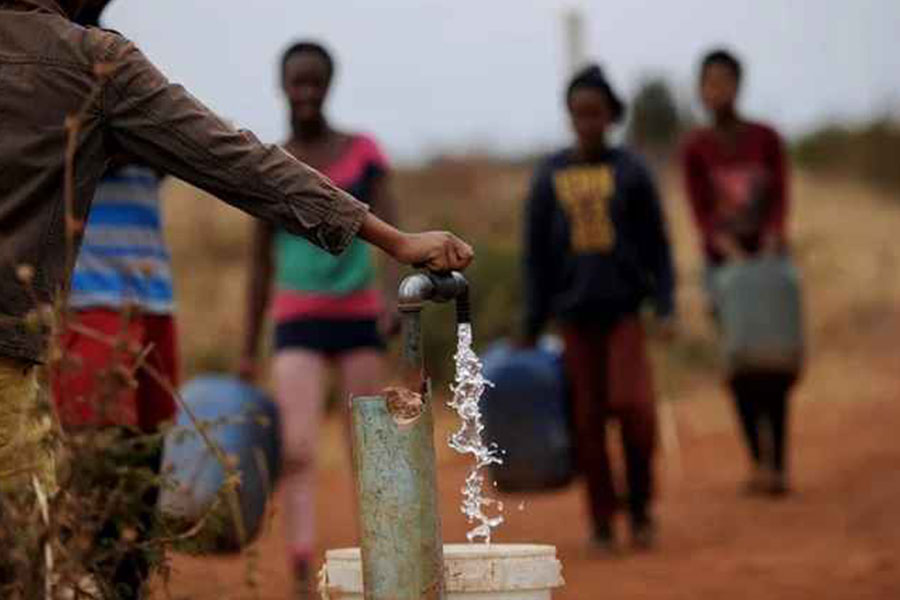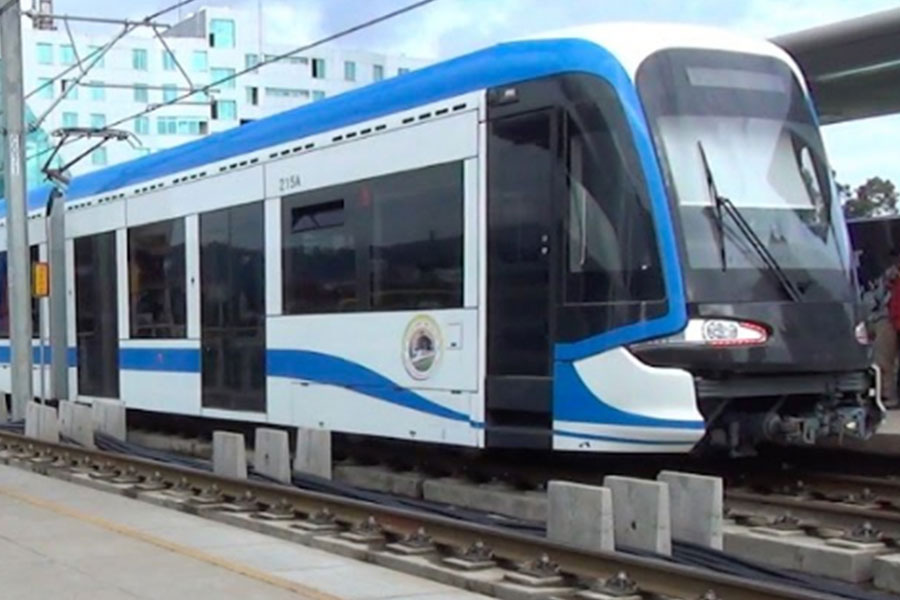
Fortune News | May 25,2024
The desk where the conductor issues tickets inside the office of Noah Transport, S.C., close to Estifanos Church and opposite Mesqel Square, takes up nearly half of the space inside the small room. A chair behind the desk where the conductor sits and two adjacent benches, reserved for customers, take up the rest of the area.
The conductor is unusually busy responding to queries about the resumption of transport services to Alamata, a weredalocated in the southernmost tip of Tigray Regional State. He reassures inquirers, to their delight, that the bus is scheduled to go in a couple of days, and they can purchase tickets until then.
The ticket office is one of many that line the street, each with their own distinctive name and advertising on the front. Over the past two days, sales agents, who roam the nearby areas looking for potential travelers, have added Alamata to the routes they advertise.
Girmaye Woldu, an older man who lives in Addis Abeba, has come to the ticket office as he had also heard that the roads to the region have reopened. His 91-year-old mother lives in Meqelle, and he is hoping to deliver some much-needed medicine to her.
"She has nerve problems," he said. "She can't get her medicine in the country."
Girmaye has not heard anything from his mother or other family members since an armed conflict broke out in the region in early November. Telecommunications, power and transportation have all been cut off in the Regional State following a law enforcement operation launched by the federal government against the region's former administration.
With federal government forces claiming victory over Meqelle, the region's capital, at the end of last month, the partial restoration of transport and communications lines to some outlying towns have given hope to many. The latest has been the reopening of telecom services in Alamata, as well as the recommencement of transportation between the town and the regional capital. Girmaye is planning to head there himself and send the medicine through a car from Alamata to Meqelle.
"I've heard that smaller cars are going to Meqelle," he said. "I'm willing to pay any price to drivers to deliver her medicine."
The Wereda's main bus station has reopened since its closure following the declaration of a state of emergency in the Regional State. This is a relief not only for Girmaye but also for the luxury bus companies that have taken a massive hit to their income due to the conflict.
Ticket offices for numerous luxury cross-country buses line the street next to Estifanos Church, across from Mesqel Square, where many are now venturing to inquire about trips to Alamata in Tigray Regional State.
The luxury buses that these companies manage are different from the regular buses operating in the country for many reasons. For one, they require much more investment with prices for a single bus ranging up to six million Birr, more than double that of their regular counterparts. These buses also offer different amenities like air conditioning and wifi services, among others.
Secondly, they operate based on the demand of passengers, unlike regular buses. As long as they have the license to operate and a branch office at the destination of choice, among other requirements, the routes are theirs to operate as they see fit. The regular buses, on the other hand, have a mandated monthly schedule subject to pre-approval by the Federal Transport Authority, which puts the overall number of cross country transport buses in the country at over 1,600, operating across 224 routes.
And while the luxury buses charge as much as double the fares of regular ones, they are currently the only form of public transport heading to the Regional State.
Companies like Walia Inter-City Bus Service Enterprise used to make over 31,000 Br on a single trip to Meqelle, its longest and highest-paying route; an income that has now ceased due to the conflict. Like many operators, it used to make one regular trip a day to Meqelle but would add two or three more to the schedule depending on demand.
But the escalating security fears, coupled with the pandemic, had slowed down work long before the conflict began. These conditions have also affected the income of sales agents that make about 20 Br in commission for getting a person to buy a bus ticket. Ashenafi Minsemo, one of several agents, scouring for travelers in Meskel Square, used to find 10 to 15 customers a day.
"Nowadays, I only get four or five people, and there are even times when I get none," lamented Ashenafi. "People are afraid to travel, and that leaves me with nothing, which is very tough."
Other cross-country operators have even had to allocate their buses to the federal government. Habesha first level cross-country transport has handed over 12 of its 106 buses to the Defense Forces in Meqelle, and another 30 buses are currently operating as support for Sheger Bus in Addis Abeba.
"We used to operate 129 different routes, but we're now limited to the south and east [of the country] only," said Abraham Urkato, the manager of the company.
The total shutdown of routes to the Regional State notwithstanding, the conflict has also slowed activity on all routes to and from the capital. The disparity in frequency of travelling buses has impacted the income [of operators] by the millions, according to Muluken Melese, chairman of the Luxury Buses Coordinating Team, which has 16 member companies and 340 active buses.
In addition to this, the buses and drivers that made their way to the region's capital over a month ago have yet to be heard from.
An exception has been Habesha Bus. The company's bus assigned to the region miraculously made its way back to Addis Abeba days after conflict broke out. It had been contracted out to Chinese construction workers who were evacuating the region, according to Muluken, who also serves as the company's general manager.
The operational independence of these buses is what has prompted transport back to the region. This is why they have now started selling tickets to Alamata. There is also high demand coming from the other end.
Though there are not a lot of people who may be eager to head there, the buses are willing to make the 1,000Km journey as plenty of passengers are lined up on the other end. Operators with branch offices in the Wereda already have mounting requests for tickets to Addis Abeba.
In the past three days, people have been leaving the capital of Meqelle in droves, with up to 50 buses a day leaving the capital to Alamata, where transportation and other necessary goods are being provided, albeit at a steep price.
The cost of the trip from the town to the region's capital, which used to cost 80 Br, has skyrocketed to as high as 1,000 Br, according to reports from conductors in the Wereda. Many are making their way out to get to Addis Abeba or to buy necessary supplies like food. While the buses transport people out, they drive back loaded with fuel for sale at similarly exorbitant prices.
"There are many requests to reserve tickets to Addis Abeba even though we haven't started sales," said a conductor of one luxury bus who asked to remain anonymous.
"People are now paying up to 10 times the normal price to get out of the region," he said. "Once our buses start, the prices will go down since we operate on a fixed tariff."
They are forced to pay whatever is levied, because there's always someone happy to replace them if they disagree with the prices, according to him.
Plans to resume services for the regular buses to the region are not yet in consideration. This will have to follow communication from the security apparatus concerning the safety of the region.
Transportation heading to Meqelle and surrounding towns has been banned so far due to the conflict, according to Endalkachew Tsegaye, a communications officer at the Ministry.
"The government is focusing on calming the community and working on damaged infrastructure to bring the region to where it used to be," he said.
Transportation to Meqelle will begin when the government makes it official, he added.
Trucks carrying relief packages for those in need of food in the region have also reached their destination in Alamata, according to the National Disaster Risk Management Commission. Forty-four and 30 heavy trucks loaded with food and non-food items arrived last week to Shire and Meqelle, respectively, according to the Commission, which stated that preparations to distribute the aid are underway.
An urban road management lecturer at Kotebe Metropolitan University, Engida Tadie stresses the importance of a peaceful environment as an undeniable precondition for any movement in the country. Nonetheless, he acknowledges that its impact has been hard on those in the industry.
This ban is an obstacle to the community; incomes of cross-country transportation enterprises and associations have fallen and left drivers and aides without employment, according to Engida.
"A transportation ban will limit movement and negatively affect the economic activity and prosperity of the country," he added.
The luxury bus operators are hopeful nonetheless. They are out in full force, represented by their agents, and enticing travelers with their many amenities.
PUBLISHED ON
Dec 12,2020 [ VOL
21 , NO
1076]

Fortune News | May 25,2024

Fortune News | Apr 22,2023

Radar | Jun 08,2019

Fortune News | May 15,2021

Viewpoints | Apr 10,2021

Radar | Jul 18,2020

Commentaries | Oct 30,2022

Viewpoints | Jun 07,2020

Radar | May 21,2022

Fortune News | Jan 07,2022

Dec 22 , 2024 . By TIZITA SHEWAFERAW
Charged with transforming colossal state-owned enterprises into modern and competitiv...

Aug 18 , 2024 . By AKSAH ITALO
Although predictable Yonas Zerihun's job in the ride-hailing service is not immune to...

Jul 28 , 2024 . By TIZITA SHEWAFERAW
Unhabitual, perhaps too many, Samuel Gebreyohannes, 38, used to occasionally enjoy a couple of beers at breakfast. However, he recently swit...

Jul 13 , 2024 . By AKSAH ITALO
Investors who rely on tractors, trucks, and field vehicles for commuting, transporting commodities, and f...

Oct 18 , 2025
The political establishment, notably the ruling party and its top brass, has become p...

Oct 11 , 2025
Ladislas Farago, a roving Associated Press (AP) correspondent, arrived in Ethiopia in...

Oct 4 , 2025
Eyob Tekalegn (PhD) had been in the Governor's chair for only weeks when, on Septembe...

Sep 27 , 2025
Four years into an experiment with “shock therapy” in education, the national moo...